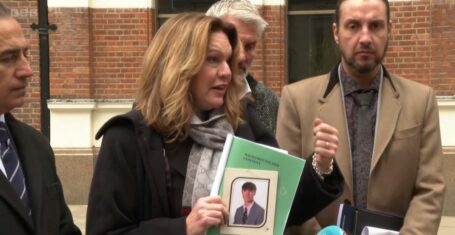
Nottingham students protest in London against uni fees
One girl dressed up as Theresa May
With university fees set to rise again to £12,000 by 2026, the university of Nottingham’s socialist students and feminist society took to the streets of London under the NUS National Demo: United for Education on November 19th to show the Tories they’ve had enough. The day was full of anger, but mostly a sense of fear and sadness for the ongoing attacks against students.
Tuition fees: a background
Tuition fees were introduced in the first term of Tony Blair’s Labour government. Students who began their courses in Autumn 1998 were to pay £1,000 a year (seems like a bargain nowadays right?). In 2006, this was controversially tripled to £3,000, and by 2012 the figure was tripled again to a cap of £9,000 by the coalition government for students starting university in 2012. This was the policy which caused the Liberal Democrats an intense amount of hate: tripling tuition fees after promising to abolish them entirely.
What this means is that over the course of 14 years tuition fees were tripled three times, but why? The truth is you’ll get a different answer from almost anyone you talk to. Tuition fees were initially sold as a means of reducing the gap, of encouraging students from low income households to engage in higher education and transform the traditionally elitist system into one of mass participation. Blair’s labour government tackled this investment in education by introducing a means tested fee, stating that those enjoying the “privilege” of higher education should help to raise the funds for it. However, as fees rose across the millennium, it was becoming more and more obvious that students were being used as a pawn in the governments cost cutting system. By 2012, many students got the feeling that they were being blamed for the increasing deficit- a burden on the taxpayer.
Has it worked? Why raise it again?
The total number of English-resident students applying to UK universities fell after the introduction of reforms, and is yet to return to the peak reached in the 2011 entry cycle. The fall was significantly greater in England than the rest of UK, particularly Scotland where tuition fees were not introduced. It is not clear if the extra financial support has increased participation: disadvantaged groups have shown no tendency to favour universities offering higher financial support, according the the Office for Fair Access. What’s more, roughly 73 per cent of graduates will not repay their debt in full, compared with the 32 per cent under the older system. It hits women hard too: the average female graduate is expected to only pay back half, be employed for a shorter period of time and earn less on average, whilst male graduates pay back 87 per cent of what they borrow.
What’s clear from this is that tuition fees are not earning the government back any money- so why scrap maintenance grants and NHS bursaries, increase fees to £9, 250 by 2017/18 and up to £12, 000 by 2026?
Nottingham students protest
That’s exactly what the University of Nottingham socialist students and feminists were asking when they headed to London to protest this past Saturday. The day was organised by the National Union of Students who named the protest “United for Education” and called on students across the UK to meet in London and show the government just how betrayed they felt. The NUS set our the terms of the march on the event page: resist the governments war on students and our education, march in our thousands and show them we will not be ignored. The Nottingham presence came from members of the socialist and feminist societies who left University Park at 8am to meet the rally in London.
The march began at Park Lane and ended outside the Houses of Parliament in Westminster, where speakers from across the education sector spoke to students in an attempt to encourage empowerment. There was a large police presence throughout the day and Nottingham students were given advice regarding what to do in a situation where arrest was threatened. The force was so strong that the streets of London were shut off for the marchers: the sight of thousands of angry students and supporters walking, running and dancing past a Trafalgar Square at stand still was one to behold. It wasn’t just students who got involved, but their parents too, showing the true weight of tuition fees in this country.
By the time the procession got to Westminster, there wasn’t a tourist or MP that could ignore the sound of chants such as “Education is a right, not a privilege” or the sight of thousands of banners, signs and cardboard cut outs, branded with slurs against the fees that passed.
One girl even dressed up as Theresa May, in a cheap tweed suit, wig and face paint, and held a sign saying “Fuck the Tories: they need a good shag.” At the end of the march the NUS held an after party, headlined by rapper Big Narstie, to raise the protesters spirits.
After calls across the globe to rise up against political systems increase, the march showed the power of protests to get a voice heard. And it’s not just students in the UK that are feeling isolated; in September students in South Africa clashed with police during a protest against an 8 per cent rise in tuition fees, whilst students across Spain have been engaged in ongoing strikes against reform to the country’s education law, change in the duration of university degrees and university fee hikes.
It seems that across the world, students are being repeatedly exhausted, targeted and abused by a system designed to educate and inspire them against that exact behaviour.
Sign the petition against the increase of tuition fees:









































